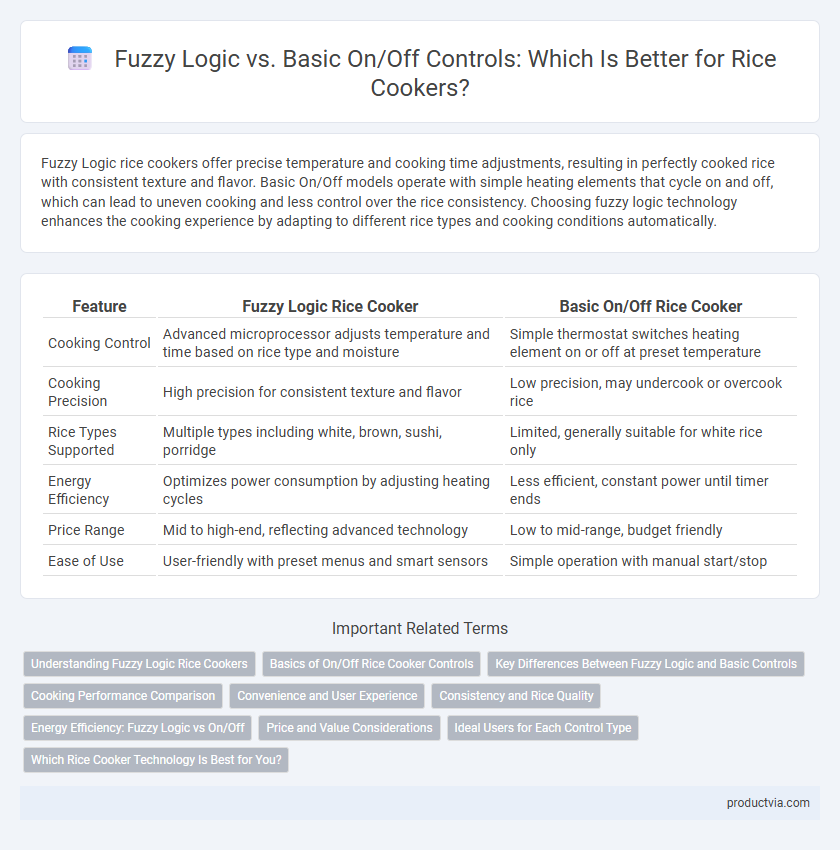Fuzzy Logic rice cookers offer precise temperature and cooking time adjustments, resulting in perfectly cooked rice with consistent texture and flavor. Basic On/Off models operate with simple heating elements that cycle on and off, which can lead to uneven cooking and less control over the rice consistency. Choosing fuzzy logic technology enhances the cooking experience by adapting to different rice types and cooking conditions automatically.
Table of Comparison
| Feature | Fuzzy Logic Rice Cooker | Basic On/Off Rice Cooker |
|---|---|---|
| Cooking Control | Advanced microprocessor adjusts temperature and time based on rice type and moisture | Simple thermostat switches heating element on or off at preset temperature |
| Cooking Precision | High precision for consistent texture and flavor | Low precision, may undercook or overcook rice |
| Rice Types Supported | Multiple types including white, brown, sushi, porridge | Limited, generally suitable for white rice only |
| Energy Efficiency | Optimizes power consumption by adjusting heating cycles | Less efficient, constant power until timer ends |
| Price Range | Mid to high-end, reflecting advanced technology | Low to mid-range, budget friendly |
| Ease of Use | User-friendly with preset menus and smart sensors | Simple operation with manual start/stop |
Understanding Fuzzy Logic Rice Cookers
Fuzzy logic rice cookers use advanced microcomputer technology to adjust cooking time and temperature based on real-time feedback, resulting in perfectly cooked rice every time. Unlike basic On/Off models that operate on fixed heating cycles, fuzzy logic models continuously monitor and fine-tune the cooking process to accommodate different rice types and textures. This intelligent control enhances cooking precision, prevents overcooking or undercooking, and delivers consistent results.
Basics of On/Off Rice Cooker Controls
Basic On/Off rice cooker controls operate using a simple mechanism that switches the heating element on to cook and off to keep the rice warm without adjusting temperature or cooking time dynamically. This control method relies on a thermostat to detect when the water has evaporated, triggering the cooker to switch from cooking to warming mode. Despite its simplicity and affordability, the On/Off control offers less precision in moisture and texture compared to advanced fuzzy logic systems.
Key Differences Between Fuzzy Logic and Basic Controls
Fuzzy logic rice cookers use advanced sensors and algorithms to adjust cooking time and temperature dynamically, ensuring optimal rice texture and flavor. Basic On/Off rice cookers operate with fixed heating cycles, turning the heating element on or off based on preset timers without adjusting for varying rice types or conditions. The key difference lies in precision and adaptability; fuzzy logic models provide consistent results by continuously monitoring and reacting to cooking variables, while basic models rely on simple, fixed control mechanisms.
Cooking Performance Comparison
Fuzzy Logic rice cookers utilize advanced microcomputer technology to adjust cooking temperature and time dynamically, resulting in more precise cooking and better texture of rice compared to Basic On/Off models. Basic On/Off rice cookers operate with fixed temperature settings, which can lead to inconsistent cooking results and occasional overcooking or undercooking. The adaptive algorithms in Fuzzy Logic models enhance moisture retention and grain separation, providing superior cooking performance and rice quality.
Convenience and User Experience
Fuzzy logic in rice cookers offers precise temperature and cooking time adjustments, ensuring perfectly cooked rice with minimal user input, enhancing overall convenience. Basic On/Off controls rely on preset timers without adapting to variations in rice type or moisture, often requiring manual monitoring and adjustments. Fuzzy logic technology improves user experience by providing consistent cooking results and reducing guesswork.
Consistency and Rice Quality
Fuzzy logic rice cookers use micro-computerized sensors to adjust temperature and cooking time dynamically, resulting in consistently perfectly cooked rice with optimal texture and flavor. Basic On/Off models operate on simple temperature thresholds, often causing uneven cooking, undercooked grains, or burnt rice due to lack of precise control. The advanced algorithm in fuzzy logic systems enhances rice quality by adapting to variations in rice type and moisture level, ensuring superior consistency every time.
Energy Efficiency: Fuzzy Logic vs On/Off
Fuzzy Logic rice cookers optimize energy consumption by constantly adjusting heating power and cooking time based on real-time feedback, leading to more precise temperature control and reduced energy waste. Basic On/Off cookers operate by simply turning the heating element on or off, resulting in less efficient energy use due to temperature fluctuations and overcooking. Studies show that Fuzzy Logic models can save up to 30% more energy compared to traditional On/Off rice cookers.
Price and Value Considerations
Fuzzy logic rice cookers typically cost more upfront but offer precise temperature and cooking time adjustments, resulting in consistently better rice quality and less guesswork. Basic On/Off models are more affordable, making them suitable for budget-conscious buyers who prioritize simplicity over advanced features. The higher price of fuzzy logic cookers is often justified by their long-term value through improved texture and energy efficiency.
Ideal Users for Each Control Type
Fuzzy logic rice cookers suit users seeking precise cooking with varied rice types, as they adjust temperature and time dynamically for optimal results. Basic On/Off rice cookers are ideal for budget-conscious users or those who prefer simplicity and consistent cooking without advanced features. People who cook rice infrequently or prefer straightforward operation benefit most from Basic On/Off models, while frequent cooks and rice enthusiasts gain from the versatility of fuzzy logic controls.
Which Rice Cooker Technology Is Best for You?
Fuzzy Logic rice cookers offer precise temperature and cooking time adjustments by continuously monitoring and adapting to the cooking process, resulting in perfectly cooked rice with enhanced texture and flavor. Basic On/Off rice cookers operate with simple heating elements that cycle on or off, making them more affordable but less consistent in cooking quality. Choosing between Fuzzy Logic and Basic On/Off depends on your budget and preference for advanced cooking performance versus straightforward, cost-effective functionality.
Fuzzy Logic vs Basic On/Off for rice cooker controls Infographic

 productvia.com
productvia.com